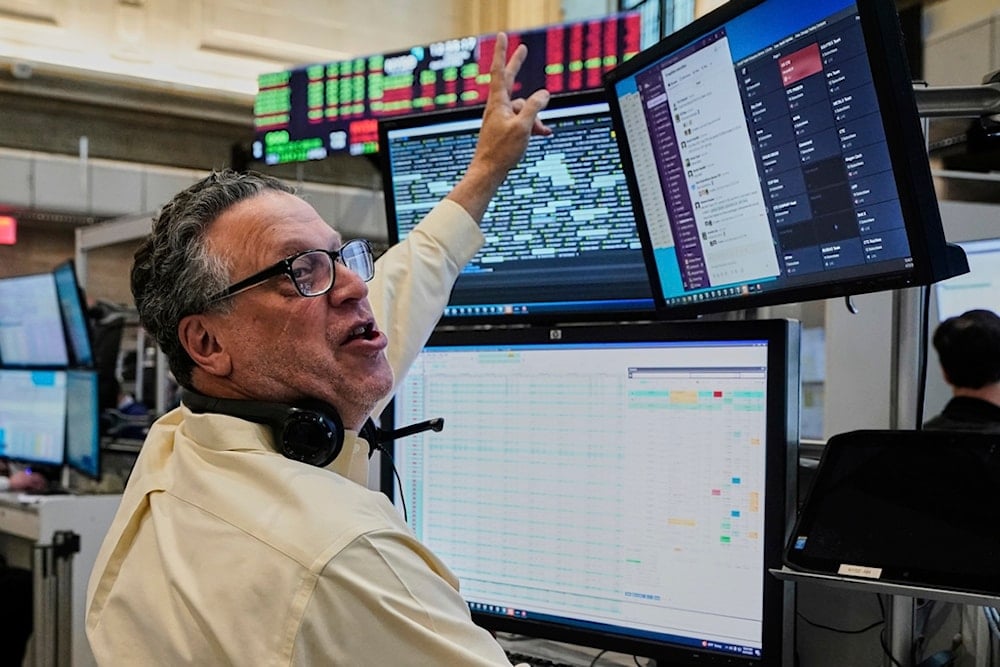US stocks rise after Trump opts for a gentler tone on China
US stocks rise as markets respond positively to trade negotiations and stability in Federal Reserve leadership, with gains led by Boeing, Tesla, and major tech firms.
-

Options trader Martin Handler works on the floor of the New York Stock Exchange, Wednesday, April 23, 2025 (AP)
Wall Street stocks posted solid gains for a second consecutive session on Wednesday, as investors responded positively to the Trump administration’s more conciliatory approach to trade negotiations with China.
Markets remained in positive territory throughout the day, buoyed by additional reassurance from US President Donald Trump, who stated he had no intention of removing Federal Reserve Chair Jerome Powell.
The Dow Jones Industrial Average closed up 1.1% at 39,606.57. The broader S&P 500 rose 1.7% to 5,375.85, while the tech-heavy Nasdaq Composite Index surged 2.5% to 16,708.05.
Markets shrug off global growth concerns
Despite a recent downgrade of global growth forecasts by the International Monetary Fund and a cautious Federal Reserve Beige Book report noting that the economic outlook had "worsened considerably" in several US regions due to tariff uncertainty, investor sentiment remained upbeat.
Art Hogan of B. Riley Wealth Management explained that markets were reacting positively to "any headline that's less negative on trade." He noted, "We've moved into a slightly more positive position, but we still don't know what the endgame will be on trade."
Trump plays up fair deal with China
Speaking to reporters on Wednesday, Trump said that the US would have a "fair deal with China," saying that "everything's active," when asked if the governments are in contact.
However, the US president said that the timeline of lowering tariffs on Chinese goods "depends on them."
Treasury signals tariffs unsustainable
Treasury Secretary Scott Bessent commented that Washington is "not yet" engaged in active tariff discussions with Beijing. He acknowledged that the current tariff levels from both the US and China were not "sustainable" in the long term.
Boeing led individual stock gains, rising 6.0% after reporting a smaller-than-expected loss and reaffirming its 2025 target to increase commercial aircraft production.
Tesla shares climbed 5.4% despite disappointing earnings, as CEO Elon Musk announced he would prioritize his role at the electric vehicle manufacturer, reducing his involvement in Trump's Department of Government Efficiency.
Other technology giants also performed strongly. Amazon rose 4.3%, Meta (parent company of Facebook) gained 4%, and Microsoft increased by 2.1%, contributing to the Nasdaq’s significant rise.
Trump economic approval plummets
Reuters on Wednesday published results from a joint poll conducted with Ipsos, revealing a sharp decline in public support for Trump's handling of the US economy.
Only 37% of Americans now approve of his economic performance, down from 42% at the start of his term. The poll, conducted between April 16 and 21 and involving 4,306 US adults, has a margin of error of about two percentage points.
The survey also showed that 75% of respondents are concerned that a recession may be on the horizon—an anxiety that coincides with the White House's increasingly controversial trade policy.
In response to mounting inflation, rising consumer prices, and business pushback, the Trump administration is now reportedly considering rolling back tariffs on Chinese imports, according to The Wall Street Journal.
Soaring tariff tensions
The policy reevaluation follows a wave of criticism after the White House enacted sweeping trade measures earlier this month, including a universal 10% tariff on all imports and reciprocal tariffs of up to 245% targeting nations with large trade surpluses.
Facing industry resistance—particularly from the tech sector—the administration has already backtracked on some measures.
On April 12, it announced exemptions for key electronics like smartphones, laptops, and semiconductors, which are heavily sourced from China. These exemptions, made retroactive to April 5, highlight a growing recognition that the blanket tariff approach could be economically damaging.
Read more: Trump exempts key Chinese electronics from harsh tariff regime
Meanwhile, tensions with the media have intensified. Elon Musk recently accused Reuters of accepting "millions of dollars from the US government for misleading the audience." Trump echoed the claim, calling on the agency to return the funds.

 4 Min Read
4 Min Read










